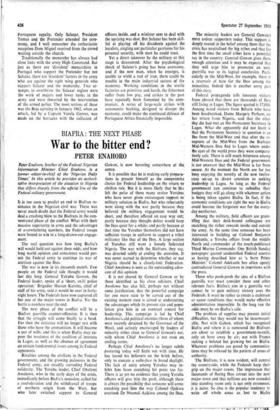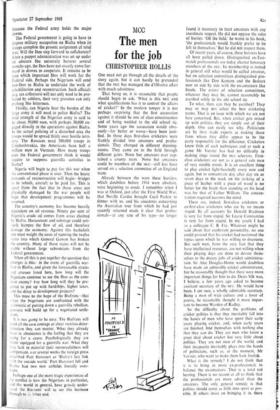War to the bitter end ?
BIAFRA : THE NEXT PHASE PETER ENAHORO
Pater Enahoro, brother of the Federal Nigerian Information Minister Chief Enahoro, is a fawner editor-in-chief of the Wigerian Daily T.Imes.' In this article he provides an authori- tatIve interpretation of the situation in Nigeria that differs sharply from the official line of the Federal military government.
It is too soon to predict an end to Biafran re- sistance in the Nigerian civil war. There was never much doubt that the Federal army would deal a crushing blow to the Biafrans in the con- ventional phase of the conflict. What with their massive superiority in arms and the advantages of overwhelming numbers, the Federal troops were bound to win in a long-drawn-out engage- ment.
The real question was how long Biafra's will would hold out against these odds, and how Jong world opinion and conscience would per- mit the Federal army to continue its war of attrition against the Ibos.
The war is now in its sixteenth month. Few people on the Federal side thought it would last this long. General Yakubu Gowon, the Federal leader, spoke of a `short, swift police operation.' Brigadier Hassan Katsina, chief of staff of his army, said it would be over in forty- eight hours. The Federals have now captured all but one of the major towns in Biafra. Yet the battle is nowhere near the end.
The next phase of the conflict will be a Biafran guerrilla counter-offensive. It is then that the struggle will come finally to a head. For then the initiative will no longer rest with those who have the ammunition. It will become a test of wills, and this is when Biafra may ex- pose the weakness of the coalition of interests in Lagos, as well as the absence of agreement on certain fundamental issues among its Federal opponents.
RiValries among the civilians in the Federal government, and the growing jealousies in the Federal army, are steadily corroding Federal solidarity. The Yoruba leader, Chief Obafemi Awolowo, who in the early days of the crisis, immediately before Biafra's secession, called for a confederation and the withdrawal of troops of northern origin from the West, but who later switched support to General Gowon, is now hovering somewhere at the centre.
It is possible that he is making early prepara- tions to present himself as the compromise choice for Federal leadership on the return to• civilian rule. But it is more likely that he bias felt the pulse of those many restive Yornbas, who have never given extravagant support to military solution in Biafra, but who reluctantly went along with the war partly because they believed the military engagement would be short, and therefore offered an easy way out; partly because they thought defeat would keep the Ibos quiet for a while; and partly because at that time the Yorubas themselves did not have sufficient troops in uniform to support a tribal militancy like that of the Ibos. A large section of Yorubas still want a loosely federated Nigeria. The war with the Biafrans, they say, was directed solely at ending the secession. It was never started to determine whether or not Nigeria should be a closely-knit Federation. Chief Awolowo is seen as the outstanding advo- cate of this opinion.
It is not shared by General Gowon or by those identified as his close advisers. Chief Awolowo has also felt, perhaps not without some justification, that the powerful campaign for one more state to be carved out Of the existing western state is aimed at undercutting the advantages which its present size and 'popu- lation give him in an eventual contest for leadership. This campaign is led by Chief Awolowo's old political enemies (three of whom were recently detained by the Governor of the West), and actively encouraged by leaders of minority tribes close to General Gowon's ear, with whom Chief Awolowo is not even on, smiling terms.
Perhaps Chief Awolowo's no longer subtle posturing today will fizzle out with time. He has teased his believers on the brink before, only to execute a volte-face in broad daylight. The lack of unity among Yorubas may in- hibit him from stretching his point too far. There is as yet no evidence that young Yoruba officers will -give him the push, although there is always the possibility that someone will come streaking past him the way Colonel Ojukwu overtook Dr Nnamdi Azikiwe among the Ibos. The minority leaders are General Gowon's most ardent supporters today. This support is deeply rooted in the belief among them that the crisis has neutralised the big tribes and that for the first time the small tribes have a powerful say in the country. General Gowon gives them enough attention and it may be expected that they will urge him to prosecute an anti- guerrilla war to its logical conclusion. Parti- cularly in the Mid-West, for example, there is a reservoir of hate for the Ibos among the minorities. Indeed this is another sorry part of this story.
Federal propaganda tells innocent visitors from abroad that there are thousands of lbos still living in Lagos. The figure quoted is 17,000. Among noted visitors from Britain who have been hoodwinked, Dame Margery Perham, on her return from Nigeria, said that the other day she had met an Ibo Permanent Secretary in Lagos. What she apparently did not learn is that the Permanent Secretary in question is an the from the Mid-West and that after the re- capture of the Mid-West from the Biafrans Mid-Western Ibos fled to Lagos where under the eyes of the world press they were compara- tively safe. There is still much bitterness among Mid-Western Ibos and the Federal government is not unaware that the Mid-West is far from secure. At the moment the North are far too busy enjoying the novelty of the new twelve- state set-up to divert attention to seeking leadership in Lagos. As long as the Federal government can continue to subsidise their budgets they will go along with whatever action is being taken against Biafra. In fact, if the economic conditions are right the war in Biafra could become the forgotten war for the every- day northerner.
Among the military, field officers are grum- brmg that their desk-bound colleagues are snatching the richer rewards inside and outside the army. At the same time someone has been interested in building tip Colonel Benjamin Adekunle, a Yoruba officer from the middle North and commander of the much-publicised Third Marine Commando. One British Sunday newspaper quoted unidentified Federal sources as having- described him as `a born Prime Minister.' Colonel Adekunle has often openly contradicted General Gowon in interviews with the press.
Those who pooh-pooh the idea of a Biafran guerrilla war must consider these and other relevant facts. Biafra's aim in a guerrilla war cannot be to gain military victory over the Federals. It must be rather to create a stalemate or cause conditions that would make effective administration impossible. In the long run the odds must be on Biafra's side.
The problem of supplies may present initial difficulties, but they would not be insurmount- able. Not with Gabon, which has recognised Biafra and where it is rumoured the Biafrans are about to establish a government-in-exile, only an hour away by air; not with France staking a belated but growing bet on Biafra. Whatever problems are posed by communica- tions may be relieved by the pattern of areas of authority.
The Biafrans, it is now evident, will control the countryside, while the Federals keep their grip on the major towns. The impression that thousands of fleeing Ibos retreat into the next major town and that millions are now crowded into standing room only is not only erroneous, it is naive. So also is, the popular tendency to write off whole areas as• lost to Biafra
because the Federal army holds the major towns•
The Federal government is going to have to impose military occupation on Biafra when its troops complete the present assignment of total war. Will the Ibos step forward to collaborate? Since a puppet administration was set up under an obscure Ibo university lecturer several months ago, the Ibos have not exactly come for- ward in droves to cooperate. It remains to be seen which important Ibos will work for the Federal side. Perhaps the Nigerians will send non-Ibos to Biafra to undertake the work of rehabilitation and reconstruction. Such officials (e.g. tax collectors) will not only need to be pro- tected by soldiers, their very presence can only prolong Ibo bitterness.
Thirdly, can Nigeria bear the burden of the large army it will need to police Biafra? The total strength of the Nigerian army is said to be about 50,000 men, with perhaps 30,000 en- gaged directly in the operations against Biafra. In the actual policing of a disturbed area the troops would be spread thinly over hostile terri- tory. The Russians need 500,000 troops in Czechoslovakia, the Americans have half a million men in Vietnam. How many troops does the Federal government think it would require to suppress guerrilla activities in Biafra?
Nigeria will begin to pay for this war when the conventional phase is over. Then the heavy demands of reconstruction will begin—bridges to be rebuilt, aircraft to be paid for. This is apart frOm the fact that in those areas .not physically damaged by the war people will hope that development- programmes will be resumed.
The country's economy has become heavily dependent on oil revenue. Ninety per cent of Nigeria's crude oil comes from areas claimed by Biafra. Harassment and sabotage could seri- ously hamper the flow of oil, and therefore damage the economy. Against this backcloth one must weight the costs of running the twelve states into which General Gowon has broken the country. Many of those states will not be viable without large subventions from the Federal government.
When all this is put together the question that emerges is this: in the event of guerrilla war- fare in Biafra, and given the foreseeable strains and stresses listed here, how long will the Nigerians continue to see the Ibos as the com- mon enemy? For how long will they be pre- pared to put up with hardships, higher taxes, and the delay to development projects?
This must be the hope of the Biafrans—that a hen the Nigerians are confronted with the :arithmetic of putting down a guerrilla rebellion, pressure will' build up for a negotiated settle- ment.
It is not going to be easy. The Biafrans will need all the coma courage or sheer reckless deter- mination they can muster. What they already have in abundance is the feeling that they are ding for a cause. Psychologically they are better equipped for a guerrilla war. What they :nay lack in material their resourcefulness will -ompensate. ror several weeks the foreign press described Port Harcourt as 'Biafra's last link pith the outside world.' Port Harcourt fell and Biafra had two new airfields literally over- night.
Perhaps one of the most tragic experiences of the conflict is how the Nigerians in particular, and the world in general, have grossly under- iated the Bialrans' will to see this business through to itL b'tter end.











































 Previous page
Previous page